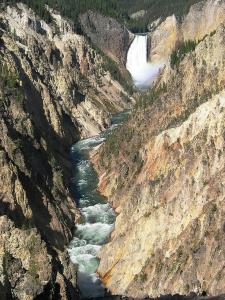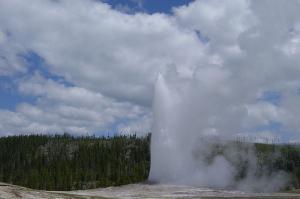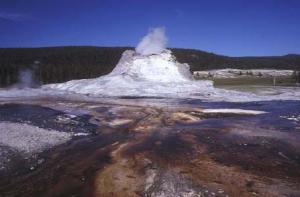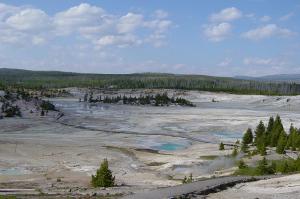 50 years ago this summer, I went to Yellowstone National Park to fulfill my first preaching assignment. Mind you, I had not yet been to seminary, though I was admitted and ready to start in the fall of 1968. And since I had not been raised in the church, having attended only a few times in my Phoenix growing up years, though nearly every Sunday during my college days (if you wanted to sing in choir, you HAD to attend college chapel), my models for the preaching art were few. Still, I found myself in a pulpit at an outdoor amphitheater each Sunday that summer, backed by a magnificent view of mountain and stream near the Madison Junction Campground. Diana, my wife now of nearly 49 years, played a bulky pump organ while I led the singing for some 300 or so congregants who came from their tents, campers, and fancy Airstreams to church. Just this past summer, Diana and I visited the space again, and very little had changed: the pews were weathered and cracked, the pulpit was still the one I had used, and the large screen, that someone had raised to block the wonderful vista, fearing inattention to the Word (?), was blessedly down. It was a lovely time of remembrance for us, but a rather sad commentary on the park service’s sore lack of funds to maintain the site.
50 years ago this summer, I went to Yellowstone National Park to fulfill my first preaching assignment. Mind you, I had not yet been to seminary, though I was admitted and ready to start in the fall of 1968. And since I had not been raised in the church, having attended only a few times in my Phoenix growing up years, though nearly every Sunday during my college days (if you wanted to sing in choir, you HAD to attend college chapel), my models for the preaching art were few. Still, I found myself in a pulpit at an outdoor amphitheater each Sunday that summer, backed by a magnificent view of mountain and stream near the Madison Junction Campground. Diana, my wife now of nearly 49 years, played a bulky pump organ while I led the singing for some 300 or so congregants who came from their tents, campers, and fancy Airstreams to church. Just this past summer, Diana and I visited the space again, and very little had changed: the pews were weathered and cracked, the pulpit was still the one I had used, and the large screen, that someone had raised to block the wonderful vista, fearing inattention to the Word (?), was blessedly down. It was a lovely time of remembrance for us, but a rather sad commentary on the park service’s sore lack of funds to maintain the site.
During the week, I worked six days, eight hours a day, at a park service station, not far from the famous Old Faithful geyser basin. That station, too, was still there last summer, though another larger and more modern one had been added not far away. I well remembered how after each irruption of the geyser, legions of cars would stream toward our station, and we attendants would rush to clean windows, fill tanks, and offer other services as needed. That was a long time ago, when a trip to the gas station included personal services that one only finds in Oregon today. I did not know a dipstick from a water hose when I started work at that station, but I learned enough during my time there that I was asked to return the next summer as an assistant manager; that proved how desperate they were for continuous and semi-experienced help! I declined, since Diana and I decided to marry that next summer. That event proved rather more important than a return to the business of pumping gas!
 It was a wonder to be in that unique place for an entire summer. Most people witness only Old Faithful, the Grand Canyon of the Yellowstone, and perhaps an easily accessible geyser pool or two, but we got into some rather more remote parts of the vast park. We saw Castle geyser that only erupts perhaps once a month, along with other strange pools, filled with colors and rotten egg smells that periodically would rise up like a wave and wash its scalding water over unsuspecting viewers. Yellowstone is a place of magic, its landscape found in very few places on the planet. In fact, Yellowstone Park sits atop a massive caldera, the remnants of an unimaginably large volcano, that still burbles and explodes with pressures building up from below that vent regularly in spectacular displays of fountaining water. There remains the constant threat of an eruption of the ancient volcano, an eruption that would be so huge as to defy description and would wreak destruction beyond imagining. I admit that each time I walked out onto a geyser field, both 50 years ago and last year, I could not repress the fear of that titanic eruption occurring under and around and over me at any moment.
It was a wonder to be in that unique place for an entire summer. Most people witness only Old Faithful, the Grand Canyon of the Yellowstone, and perhaps an easily accessible geyser pool or two, but we got into some rather more remote parts of the vast park. We saw Castle geyser that only erupts perhaps once a month, along with other strange pools, filled with colors and rotten egg smells that periodically would rise up like a wave and wash its scalding water over unsuspecting viewers. Yellowstone is a place of magic, its landscape found in very few places on the planet. In fact, Yellowstone Park sits atop a massive caldera, the remnants of an unimaginably large volcano, that still burbles and explodes with pressures building up from below that vent regularly in spectacular displays of fountaining water. There remains the constant threat of an eruption of the ancient volcano, an eruption that would be so huge as to defy description and would wreak destruction beyond imagining. I admit that each time I walked out onto a geyser field, both 50 years ago and last year, I could not repress the fear of that titanic eruption occurring under and around and over me at any moment.
But back to my preaching at the campground. As I prepared my sermons, I had only the Bible for resource, a book about which I knew very little, or perhaps better said, I knew just enough to be very dangerous. I had taken introductory courses in both testaments in college, taught by the college chaplain. He had a seminary degree and no more, but he was a serious student of things religious, and did his best to make the old texts live for us 20th century students. It was the middle 1960’s, Vietnam was raging, and our campus was alive with anti-war sentiment. Each sermon I heard there had a definite tinge of social conscience, and I assumed that that was the preacher’s task. Martin Luther King, Jr. came to my college the year of my graduation, not long before his assassination, and preached a fiery sermon of justice. Thus, the Bible I first read there was presented as a book that majored on things just and righteous, things that valued every human being equally, things that called for a rejection of all oppression but in a non-violent way.
My Yellowstone preaching followed that pattern. I laid out my view that the Bible was a clarion call for active engagement in the works of justice. I still very much believe that all these years later. However, one Sunday after the service two quiet and surprisingly well-dressed men wanted to ask me a few questions about my sermon that day. I remember neither text nor sermon, but I do remember their line of questioning. “We welcomed your sermon, young man,” they said (I was only 22!), “but that is only the social gospel; there is another part of the gospel that you did not touch.” What they meant, I was later to discover since I had few clues that day, is that for a host of Christians, the gospel of Jesus Christ has far more to do with one’s personal relationship with God and God’s son than it had to do with what one did as a result of that relationship. I was preaching “works,” and not “faith,” they claimed, and without the latter, the former was null and void. They were Lutherans, and had been steeped in the “faith/works” language since their childhood, and they just knew that without faith works were dead, turning the words of the book of James on their head. Luther, they reminded me, had judged James a “right strawy epistle,” and that the letter to read was Paul to the Romans who had got the faith thing right.
I was completely out of my depth with these two well-versed laypersons, and had very little to say save that sermons without the demand of the gospel were finally not sermons at all. They disagreed, claiming that sermons without talk of faith were no sermons at all, and they left me that day promising to pray for me and my ministry. Religious disagreements often end like that, do they not? If we cannot agree, then we will pray, implying that our prayers will turn our antagonists to their way of thinking, the right way. I have long said that I hope that prayer is efficacious, for I have hundreds of people praying for me that I amend my heretical ways!
Still, those two earnest Lutherans set me on a course that I remain on to this day. I have now long been a teacher of preaching, and in my teaching I have urged and pleaded with my students never to focus their single-minded attentions on what we should be doing in the world. They must, I must, always remember that I have been called by God, the Creator who has been the first actor in our lives, and that without that action our tiny human works will not last but will fade away with little effect. Those men were right, in the main, although I would place far stronger emphasis on right actions than they would.
As I think back on the wonders of Yellowstone, its very existence, given by the imaginative creator, can still teach me that my actions can only have power when they are urged on by that Creator of the geysers, the hot pots, the strange pools of steam. It is that One who calls us to works of justice, the One who is the real Old Faithful, the One who creates and sustains us all.
(Images from Wikimedia Commons)











